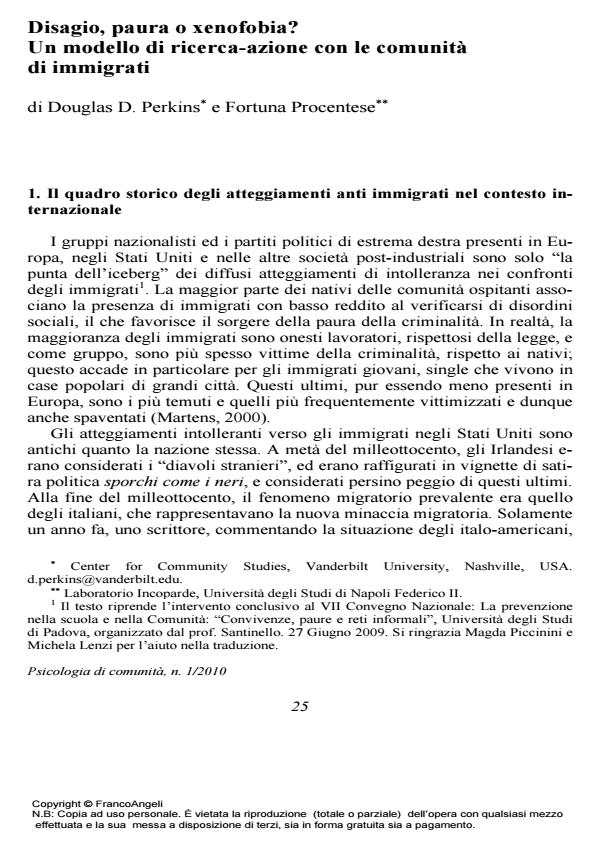Disagio, paura o xenofobia? Un modello di ricerca-azione con le comunità di immigrati
Titolo Rivista PSICOLOGIA DI COMUNITA’
Autori/Curatori Douglas D. Perkins, Fortuna Procentese
Anno di pubblicazione 2010 Fascicolo 2010/1 Lingua Italiano
Numero pagine 15 P. 25-39 Dimensione file 1182 KB
DOI 10.3280/PSC2010-001003
Il DOI è il codice a barre della proprietà intellettuale: per saperne di più
clicca qui
Qui sotto puoi vedere in anteprima la prima pagina di questo articolo.
Se questo articolo ti interessa, lo puoi acquistare (e scaricare in formato pdf) seguendo le facili indicazioni per acquistare il download credit. Acquista Download Credits per scaricare questo Articolo in formato PDF

FrancoAngeli è membro della Publishers International Linking Association, Inc (PILA)associazione indipendente e non profit per facilitare (attraverso i servizi tecnologici implementati da CrossRef.org) l’accesso degli studiosi ai contenuti digitali nelle pubblicazioni professionali e scientifiche
L’articolo esamina gli atteggiamenti e le politiche anti-immigrati negli Stati Uniti e in Europa. Nelle comunità ospitanti gli autoctoni hanno un pregiudizio verso gli immigrati con basso reddito in quanto associano la loro presenza al verificarsi di disordini sociali e questi alla percezione dell’aumento di rischio e di paura della criminalità. Pur tuttavia la maggior parte degli immigrati sono lavoratori impegnati e rispettosi della legge e, rispetto ai nativi, sono più spesso vittime di reati. I Paesi economicamente sviluppati hanno beneficiato dell’immigrazione proveniente da quelli meno sviluppati, ma hanno praticato politiche di acculturazione forzata e di esclusione sociale. La ricerca sull’immigrazione è in crescita, ma solo da poco pone attenzione all’influenza della politica e di altre macro-influenze sociali, oltre che alle risposte della comunità di accoglienza all’immigrazione. Per orientare la ricerca-intervento con le comunità di immigrati viene presentato un modello ecologico globale, a più livelli, adattato da Christens e Perkins (2008), che comprende la dimensione socio-culturale, fisica, economica e politica. Lo scopo è trasformare la xenofobia in xenofilia apprezzare la forza della diversità.;
Keywords:Pregiudizi anti-immigrati, ricerca sulle politiche dell’immigrazione, oppressione, liberazione, empowerment, benessere.
- Psychosocial Studies of Migration and Community: Introduction to the Special Issue Douglas D. Perkins, Neal A. Palmer, Manuel García-Ramírez, in Psychosocial Intervention /2011 pp.237
DOI: 10.5093/in2011v20n3a1 - Schede bibliografiche Caterina Arcidiacono, in PSICOLOGIA DI COMUNITA' 1/2018 pp.119
DOI: 10.3280/PSC2018-001008
Douglas D. Perkins, Fortuna Procentese, Disagio, paura o xenofobia? Un modello di ricerca-azione con le comunità di immigrati in "PSICOLOGIA DI COMUNITA’" 1/2010, pp 25-39, DOI: 10.3280/PSC2010-001003